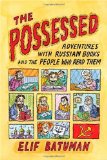Summary | Excerpt | Reviews | Beyond the Book | Readalikes | Genres & Themes | Author Bio

 Book Reviewed by:
Book Reviewed by:
Julie Wan
Buy This Book
There are certain books that one remembers together with the material circumstances of reading: how long it took, the time of year, the color of the cover. Often, it’s the material circumstances themselves that make you remember a book that way—but sometimes it’s the other way around. I’m sure that my memory of that afternoon—the smell of rain and baking chocolate, the depressing apartment with its inflatable sofa, the sliding glass door that overlooked rainy palm trees and a Safeway parking lot—is due to the precious, almost-lost quality of Babel’s 1920 diary.
The diary starts on page fifty-five—Babel lost the first fifty-four pages. Three days later, another twenty-one pages go missing—a month’s worth of entries. “Slept badly, thinking of the manuscripts,” Babel writes. “Dejection, loss of energy, I know I will get over it, but when?” For the next couple of days, despite all his efforts, everything reminds him of the lost pages: “A peasant (Parfenty Melnik, the one who did his military service in Elisavetpol) complains that his horse is swollen with milk, they took away her foal, sadness, the manuscripts, the manuscripts . . .”
The diary isn’t about war, but about a writer during a war—about a writer voraciously experiencing war as a source of material. Viktor Shklovsky, who invented the theory that literary subject material is always secondary to literary form, was a great admirer of Babel. “He wasn’t alienated from life,” Shklovsky wrote. “But it always seemed to me that Babel, when he went to bed every night, appended his signature to the day he had just lived, as if it were a story.” Babel wasn’t alienated from life—to the contrary, he sought it out—but he was incapable of living it otherwise than as the material for literature.
The epigraph to the 1920 diary could be the famous phrase from the beginning of Don Quixote: “since I’m always reading, even scraps of paper I find in the street . . .” In Brody, in the aftermath of a pogrom, while looking for oats to feed his horse, Babel stumbles upon a German bookstore: “marvelous uncut books, albums . . . a chrestomathy, the history of all the Boleslaws . . . Tetmajer, new translations, a pile of new Polish national literature, textbooks. I rummage like a madman, I run around.” In a looted Polish estate, in a drawing room where horses are standing on the carpet, he discovers a chest of “extremely precious books”: “the constitution approved by the Sejm at the beginning of the 18th century, old folios from the times of Nicholas I, the Polish code of laws, precious bindings, Polish manuscripts of the 16th century, writings of monks, old French novels . . . French novels on little tables, many French and Polish books about child care, smashed intimate feminine accessories, remnants of butter in a butter dish—newlyweds?” In an abandoned Polish castle, he finds “French letters dated 1820, nôtre petit héros achève 7 semaines. My God, who wrote it, when . . .”
These materials are assimilated and expanded upon in the Red Cavalry stories, for example in “Berestechko,” whose narrator also finds a French letter in a Polish castle: “Paul, mon bien aimé, on dit que l’empereur Napoléon est mort, estce vrai? Moi, je me sens bien, les couches ont été faciles . . .” From the phrase “ nôtre petit héros achève 7 semaines,” Babel conjures the full precariousness of time, a point as delicately positioned in human history as a seven-week-old child, or a false rumor of Napoleon’s death.
Reading the whole Red Cavalry cycle after the diary, I understood “My First Goose.” I understood how important it was that the suitcase thrown in the street by the Cossacks was full of manuscripts and newspapers. I understood what it meant for Babel to read Lenin aloud to the Cossacks. It was the first hostile encounter of writing with life itself. “My First Goose,” like much of Red Cavalry, is about the price Babel paid for his literary material. Osip Mandelstam once asked Babel why he went out of his way to socialize with agents of the secret police, with people like Yezhov: “Was it a desire to see what it was like in the exclusive store where the merchandise was death? Did he just want to touch it with his fingers? ‘No,’ Babel replied, ‘I don’t want to touch it with my fingers—I just like to have a sniff and see what it smells like.’ ” But of course he had to touch it with his fingers. He had to shed blood with his own hands, if only that of a goose. Without that blood, Red Cavalry could never have been written. “It sometimes happens that I don’t spare myself and spend an hour kicking the enemy, or sometimes more than an hour,” observes one of Babel’s narrators, a Cossack swineherd turned Red Army general. “I want to understand life, to learn what it really is.”
Excerpted from The Possessed by Elif Batuman.
Copyright © 2010 by Elif Batuman.
Published in 2010 by Farrar, Straus and Giroux.
All rights reserved. This work is protected under copyright laws and reproduction is strictly prohibited. Permission to reproduce the material in any manner or medium must be secured from the Publisher.




Everywhere I go, I am asked if I think the university stifles writers...
Click Here to find out who said this, as well as discovering other famous literary quotes!
Your guide toexceptional books
BookBrowse seeks out and recommends the best in contemporary fiction and nonfiction—books that not only engage and entertain but also deepen our understanding of ourselves and the world around us.